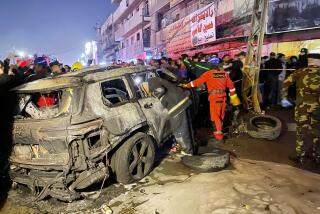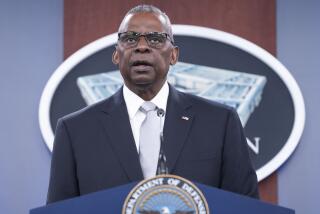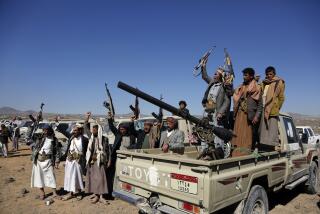U.S. copter crash kills 7 in Iraq
BAGHDAD — For the second time in three days, twin bombs tore through a busy Baghdad street, killing at least eight people Wednesday and harking back to a terrorist tactic used when sectarian violence was at its height. In southern Iraq, seven U.S. troops died when their helicopter crashed early today outside Basra.
A U.S. military spokesman said no hostile fire was suspected in the crash of the CH-47 Chinook, which went down about 12:01 a.m. It was part of an aerial convoy from Kuwait to Balad, north of Baghdad, a military statement said. The last time the U.S. lost seven troops in a day was five months ago, on April 16.
Separately, the U.S. military announced that two soldiers died Wednesday of non-combat causes. At least 4,168 U.S. soldiers have died in Iraq since March 2003.
Also Wednesday, Prime Minister Nouri Maliki said agreement was not imminent in negotiations between the Iraqi and U.S. governments over the future of U.S. troops in Iraq. The deadline for reaching an agreement is Dec. 31, when the U.N. mandate governing the U.S. presence here expires.
Maliki, speaking at a meeting of satellite TV executives, said the U.N. Security Council would have to extend its mandate if an accord was not reached. But he warned that an extension was far from guaranteed, given Russia’s sour relations with the U.S.
This would leave “the Americans in a critical stage without a legal cover” to be in Iraq, Maliki said. “We hope there will be flexibility from the American side, because the Iraqi side demonstrated flexibility.”
His comments and the day’s violence were particularly biting after weeks of relative quiet and assurances from Iraqi and U.S. officials that differences could be smoothed out.
Police said the bombs went off five minutes apart in west Baghdad’s Harthiya neighborhood, along a street lined with currency-exchange houses and a private hospital. They put the number of wounded at 20.
On Monday, two bombs went off minutes apart in east Baghdad, killing at least 13 people. In both cases, the bombs were placed in separate cars, parked on the street.
Insurgents frequently used multiple bombs last year to maximize casualties. Often the second would go off after people had rushed to the site of the first blast.
Also Wednesday, in the northern city of Mosul, the capital of Nineveh province, gunmen assassinated a top aide to the governor as the aide left a mosque. Nineveh is a stronghold of Sunni Arab insurgents loyal to Al Qaeda in Iraq, who have defied a major Iraqi and U.S. military presence in the region.
U.S. military officials say violence directed at Iraqi civilians and U.S. and Iraqi security forces is down 80% compared with 18 months ago. They warn, however, that the relative calm is not necessarily permanent. In the last week, Iraqi police say, 99 people have died in bombings of various scales across the country, including smaller roadside explosions and more deadly car bombings.
But the U.S. military is under pressure to reduce the size of its forces here, and Maliki made it clear that his government would not budge on its demand that all U.S. troops leave by the end of 2011.
Maliki also said the question of immunity for U.S. troops was “the core issue” blocking the agreement. He said he is demanding that U.S. troops be subjected to Iraqi prosecution for crimes or errors committed outside of military operations, and in some cases, during such missions.
“They do not accept this,” Maliki said of U.S. officials, who have refused to discuss the negotiations publicly.
Maliki also said Iraq wants American forces out of its cities and confined to bases on their outskirts by June 30.
Maliki added that if Iraq requested an extension of the U.N. mandate, it would attach conditions related to immunity and other issues sure to be unacceptable to the Americans.
U.S. officials have warned against a too-quick withdrawal, something they say could hinder security if Iraqi forces are not ready to take over. Some Iraqis agree.
“Our society has much to fear and worries about the deterioration of security after we’ve had this breath of fresh air,” said Hayder Adel, a high school teacher in east Baghdad. “I believe our future is unpredictable and I don’t want to take any chances of the security vacuum” if U.S. forces leave.
--
Special correspondents in Baghdad and Mosul contributed to this report.
More to Read
Sign up for Essential California
The most important California stories and recommendations in your inbox every morning.
You may occasionally receive promotional content from the Los Angeles Times.











